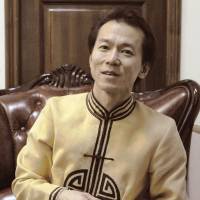A retired Japanese soloist at the world-renowned Bolshoi Ballet has established a foundation in Buryatia, a Russian federal republic in eastern Siberia, to promote local artistic activities.
Ulan-Ude, the capital of the republic, located southeast of Lake Baikal, is "a good place to live as the air is clean and people are friendly even to foreigners," Morihiro Iwata, 44, said.
When Iwata quit the Bolshoi in 2012, he was invited by the Buryat State Academic Opera and Ballet Theatre to direct its troupe of more than 50 members, and has since been working to upgrade it.
The theater, the construction of which involved Japanese soldiers held prisoner after World War II, is regarded as the best in eastern Siberia.
But unlike the Bolshoi, which constantly attracts capacity crowds, the Buryat ballet company is unable to lure audiences without efforts to arouse public interest.
Despite the reality of a local theater struggling to promote shows and attract advertisers, Iwata says he "has confidence in Buryatia's artistic activities."
The foundation established under Iwata's name at the end of last year has already financed a commemorative performance by the Buryat ballet company. Receiving financial assistance not only from supporters in Buryatia but also from Mongolia, which has strong ethnic ties with the republic, the foundation promotes ballet, martial arts, painting and other local artistic activities. It also supports young artists.
Earlier this year, the foundation donated shoes and other gear to a local ballet school and supported a photo exhibition. It plans to hold a Japan Festival in September.
"We want to introduce Buryat culture to Japan and promote exchanges" between Japan and Buryatia, Iwata said.
Iwata was born in Yokohama in 1970 and enrolled in the Moscow State Academy of Choreography in 1990. He became the first non-Russian soloist at the Bolshoi Ballet in 2003.



